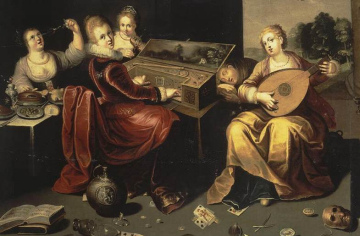The parable of the ten virgins (Matthew 25:1 - 13) was preached by Jesus at Jerusalem's temple. It was given on Sunday, April 2 in 30 A.D., just two days before his final Passover on Tuesday. Matthew is the only one of the four gospel accounts that records this story centered on virgins.
The parable revolves around ten virgins who, in the middle of the night, are notified that they must rise up and meet the approaching bridegroom. All ten bring their lamps in order to see in the darkness, but only five (referred to as being wise) bring extra oil for their journey (Matthew 25:2). The other five (the foolish virgins) take what little oil remains in their lamps and nothing more (verse 3).
And the foolish (five of the ten virgins) said to the wise, 'Give us some of your oil, because our lamps are going out.' But the wise answered, saying, 'No, lest there not be enough for us and for you. But instead, go to those who sell . . .' (Matthew 25:8 - 9, HBFV throughout).
Context
Jesus' famous Mount of Olives prophecies (Matthew 24) immediately come before the parable of the ten virgins in chapter 25. During his message, he spends a great deal of time warning Christians, in the end time, to be spiritually alert (Matthew 24:4 - 6, 23 - 28, 33, 42, 44). One of the primary reasons believers are told they must always be spiritually prepared is because they will not know the exact time the Lord will come back to earth.
For as the light of day, which comes forth from the east and shines as far as the west, so also shall the coming of the Son of man be . . . But concerning that day, and the hour, no one knows, not even the angels of heaven, but My Father only (Matthew 24:27, 36, see also verses 42 and 44).

Jesus spends the last part of his prophetic message praising those who are always ready for his return and condemning those who are not (Matthew 24:45 - 51). We then arrive at the parable of the ten virgins, a story designed to reveal an important aspect of the Kingdom of Heaven (Matthew 25:1).
Symbols
The bridegroom in the parable represents Jesus coming back to the earth. The ten virgins collectively represent Christians (the church of God) in the end time. Part of the reason for the Lord's return is so that he can resurrect and spiritually marry his church.
Let us be glad and shout with joy; and let us give glory to Him; for the marriage of the Lamb has come, and His wife (the church) has made herself ready. And it was granted to her that she should be clothed in fine linen, pure and bright; for the fine linen is the righteousness of the saints (Revelation 19:7 - 8).
Meaning
Several different meanings can be drawn from the parable of the ten virgins. The overall lesson, however, given the Biblical context, is that Christians must always be spiritually prepared to meet Jesus. Wise believers are those who always dedicate themselves to serving God and fulfilling his will (Matthew 24:45 - 47).
In our parable, the five foolish of the ten virgins represent Christians who are spiritually not ready to meet Jesus. Some of them, believing the Lord will not notice, render themselves unprepared by indulging in sin (Matthew 24:48 - 51). Still others, like the lukewarm Laodicean church (Revelation 3:14 - 18), have grown self-satisfied and spiritually stagnant. They only have enough "oil" to last a short time.